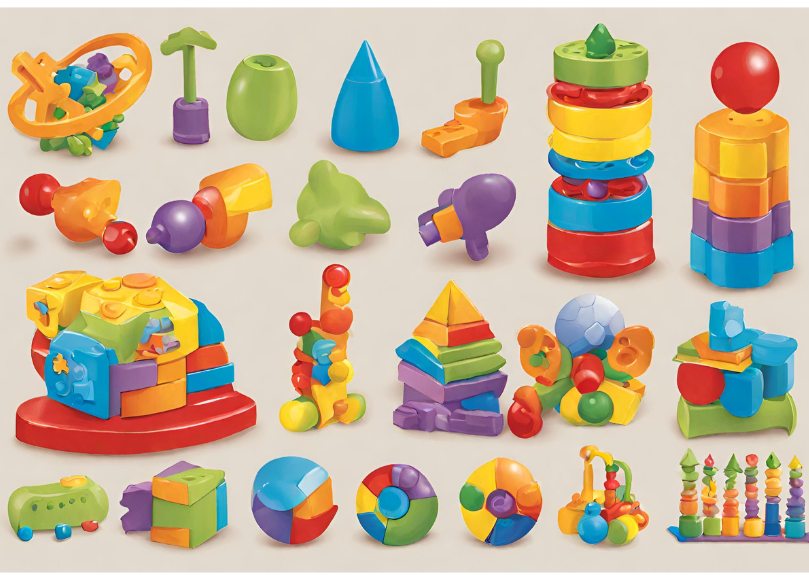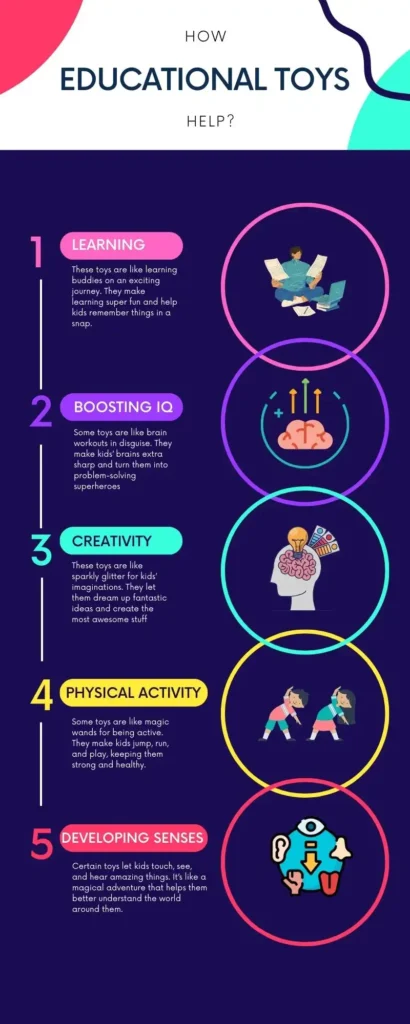Educational Toys Are Best For Your Child’s Growth and Learning
Updated: 26 Sep, 23
195
Are your children growing up and learning new things? It’s the perfect time to develop good learning habits and valuable skills for a brighter future.
Kids learn best when they enjoy themselves. If you choose educational toys, you can initially supercharge their brainpower.
In this article, we’ll discuss how toys can benefit your toddler’s mind and body.
So, let’s start!
What Are Educational Toys?
Those toys that teach something in the sense of education can be called educational toys. They can come in all shapes and sizes, from colorful building blocks to science kits and everything in between.
One child is playing with a wooden puzzle, increasing his brain power and boosting their problem-solving skills; another kid is playing a boggle online game on his computer or mobile, and he is enhancing his spelling and vocabulary skills.
All in all, we can say, that those toys through which children are learning are learning toys.

The Importance of Educational Toys
Now, Let’s talk about the importance of these toys. Children are innocent, they can make anything into toys, as they can play with the TV remote or with a room door. And many other irrelevant things.
But at the same time, if they play with a toy, it will be more enjoyable for them, and if the toy is educational, they will learn new things that will be best for their future.
These toys are designed to be fun and engaging but also teach children necessary skills and knowledge. They cover various subjects, from numbers and letters to science and creativity, making their minds sharper and encouraging them to learn more and more.
Play is the highest form of researchAlbert Einstein
Benefits of Educational Toys
These toys are designed to help kids learn and grow their mental power. They make their playtime fun and help children in different ways, such as through critical thinking, making new friends, and others, Some of those benefits are here:
| How do these benefits work? Let’s see! |
|---|
|
So, educational toys are like best buddies, making learning a blast, adventures more epic, and skills super-powered!
Toys are children’s words, and play is their language.GARRY L. LANDRETH

4. Advantages & Disadvantages of Learning Toys
Learning toys offer various advantages, including entertainment, stimulation of creativity, and children’s social interaction. They provide opportunities for learning, development, and imaginative play.
However, there are disadvantages, too. Let’s talk about them in short!
| Advantages |
|---|
|
| Disadvantages |
|---|
|
Promoting Cognitive Development
When children play with puzzles and building blocks, these toys unintentionally encourage their cognitive abilities. These toys help to promote their creativity, problem-solving, and critical thinking skills. Some of these we will discuss here:
Fine Motor Skills
Fine motor skills mean using the small muscles in your hands and fingers. These skills help you write, draw, button up your clothes, and use forks and spoons. Toys can help you improve these skills, making learning fun and easy for kids.
Fine motor skills are essential for a child’s overall growth, and suitable toys can make learning enjoyable and engaging.
| Here’s how toys aid in the development of fine motor skills: |
|---|
|
So, when selecting toys for children, consider those that provide opportunities for hands-on activities that promote fine motor skill development.
Logical Reasoning Skills
When selecting toys for children, consider those that offer strategic thinking and problem-solving opportunities, as these skills are invaluable for success in academics and life.
Parents and educators can help children develop logical, solid reasoning abilities by incorporating such toys into playtime.
| Here’s how toys can help develop logical reasoning skills: |
|---|
|
When selecting toys for children, consider those that offer strategic thinking and problem-solving opportunities, as these skills are invaluable for success in academics and life.
Parents and educators can help children develop logical, solid reasoning abilities by incorporating such toys into playtime.
Enhancing Social Skills in Kids through Learning Toys
Lots of toys are made for playing with friends. They help you learn how to play together and be good friends. Like board games, they show you how to wait your turn, follow the rules, and talk nicely to your buddies. These things are essential for having good friendships and working together.
Being good at talking and getting along with others is essential. Toys can help you get better at these things. They let you use your imagination, play with friends, and learn while having fun.
| Here’s how toys can enhance social skills in kids |
|---|
|
Conclusion:
Educational toys are crucial to empowering a child’s growth and development. They provide opportunities for children to learn and explore through play, fostering cognitive, social, and emotional skills.
| Here are the main points of the article: |
|---|
|
It’s important to consider children’s ages, interests, and developmental stages when choosing toys for them.
It is also important to choose toys that are safe and durable.
Children’s future lives are in their parents’ hands, and if they make the right decisions, they can be successful citizens of the country.
So, give time to your babies, and be friends with them!
FAQs
What is the use of toys in education?
Toys can be used as educational tools to teach children a variety of skills, including:
- Cognitive skills: problem-solving skills, critical thinking skills, and memory
- Motor skills: fine motor skills (hand-eye coordination) and gross motor skills (large muscle movements)
- Language skills: vocabulary and communication skills
- Social skills: working together and communicating effectively
- Creativity: expressing themselves creatively and coming up with new ideas
How do toys educate children?
Toys help kids learn and have fun at the same time. They let kids touch, play, and figure things out. Some toys make kids better at math and reading, while others help them make things with their hands. Toys also teach kids to be friendly and share with others.
They even let kids use their imagination to create stories and adventures. Toys are like special friends that make learning and playing exciting and easy.
Please Write Your Comments